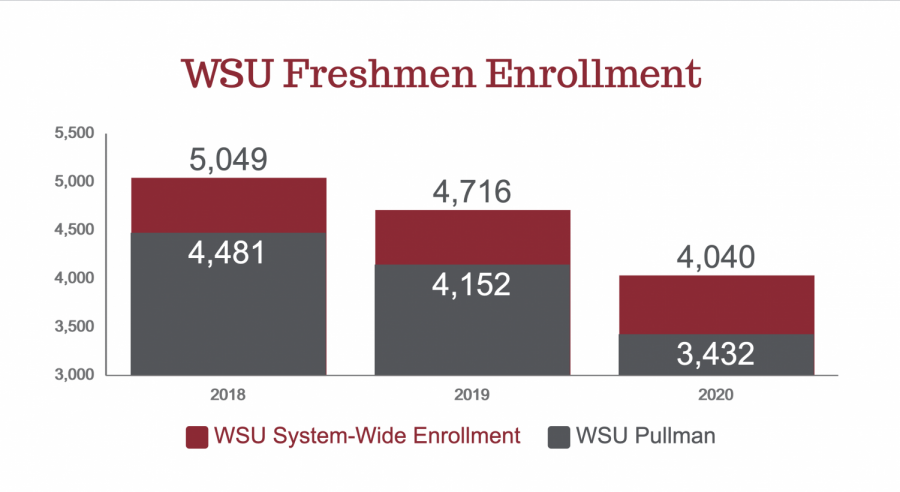WSU freshmen enrollment decreases, retention rates increase
Freshmen enrollment for Global Campus tripled; retention rates in WSU system increased from 79 to 80.6 percent
WSU Pullman’s freshmen enrollment in fall 2020 decreased by 720 students.
December 17, 2020
Freshmen enrollment across the WSU system decreased this fall, while retention rates increased.
For fall 2020, WSU had 4,040 freshmen system-wide, according to the WSU Institutional Research website. WSU Pullman accounted for 3,432 of those freshmen, which is a decrease from its 2019 enrollment of 4,152.
Although enrollment decreased from 5,048 in fall 2018 to 4,716 in fall 2019, there was an increase in retention from 79 to 80.6 percent, according to the website.
Mary Wack, WSU vice provost for academic success, said the data shows that retention rates are closely connected to students’ financial needs.
In 2019, Pell Grant-eligible students had a retention rate of 73.9 percent, which is a 1 percent increase from 2018, she said. The Pell Grant is federal aid given to low-income undergraduates.
Phil Weiler, WSU vice president for marketing and communications, said it is important to address the financial hardships students face, such as supporting one’s family and balancing work and school schedules.
“If WSU, or any university, for that matter, is able to help students find ways around financial need issues, they’re much more likely to continue with their studies,” Weiler said.
One way of addressing students’ financial needs is allowing flexibility in classes, he said. Through WSU’s Global Campus, students have the availability to maintain full-time jobs.
The Global Campus has seen a significant increase in freshmen enrollment from 2019 to 2020. Sixteen freshmen were enrolled in fall 2019 and 48 were enrolled in fall 2020, according to the website.
Wack said the success of WSU’s retention rate comes from a mixture of student life, financial aid, professors and the “Cougs Help Cougs” attitude. Although student life looks different right now, various programs are in overdrive trying to reach out to students.
Faculty members are also reaching out more often to touch base with students, Wack said. Everyone is a little overwhelmed adjusting to online classes, but they are going above and beyond to support students.
Students should not feel shy about reaching out for support, she said.
“We’re doing what we can. We really hope students will hang with us,” Wack said. “Every semester is going to get better.”
















